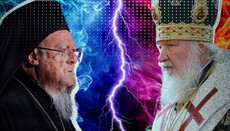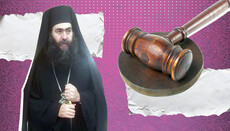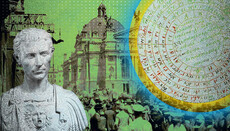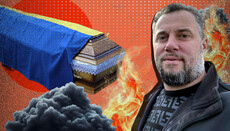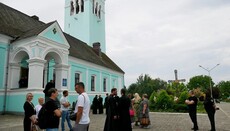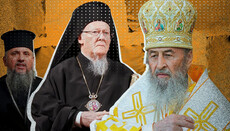Authorities vs UOC: Does Yelensky no longer believe in Zelensky?
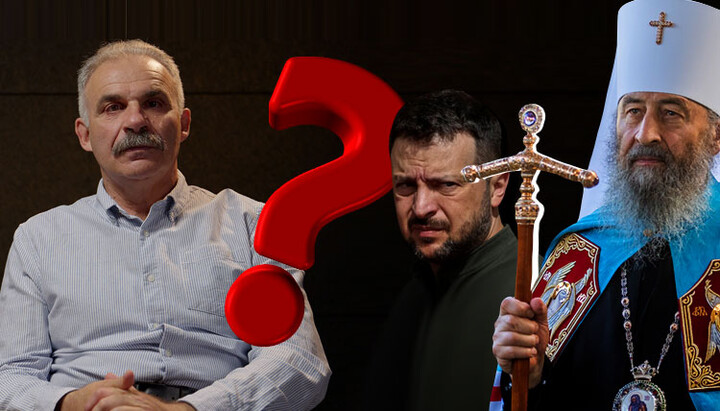
The government's campaign to destroy the UOC seems to have reached its logical conclusion, but we do not see this conclusion. Why?
On August 18, the month that Yelensky and DESS he leads gave the Kyiv Metropolis for a "break with Moscow" ended. Meanwhile, in May, the 9 months allowed by Law 3894 (referred to as the law on UOC ban) for its enforcement also expired. The media, the OCU, officials, and all sorts of patriots are exhausted, waiting for the authorities to finally begin destroying the “FSB Church”.
And, it must be said, officials did everything to justify such expectations.
The head of DESS V. Yelensky regularly gave interviews where he spoke about the UOC and its defenders in the strongest terms. He accused the UN of "manipulations" after the High Commissioner criticized the law banning the UOC, called other critics "useful idiots", stated that the UOC destruction cannot be considered a violation of religious freedom and made it clear in every way that the UOC is living its last days.
But his latest interview with "Radio Culture" caused some bewilderment. His former determination suddenly gave way to delicacy, softer wording, and a willingness to compromise.
Yelensky unexpectedly stated that he was ready to extend the “deadline” until August 24, and in case of a “justified appeal” from the UOC – another 60 days. That is, the head of GESS is prepared to give the Church, in general, another 90 days of “life”.
It should be emphasized here: Law 3894 implies that the term of existence of the "doomed" denomination can indeed be extended. But whether the previous 30 days are included in this extension is unclear. Yelensky interprets this ambiguity in favor of the UOC. Yelensky interprets this ambiguity in favor of the UOC. Where did such "mercy" suddenly come from? More on this later. For now, let's return to the beginning of the active phase in the confrontation between the authorities and the UOC.
Zelensky, Yelensky, and the UOC
Today it is believed that the UOC had problems with the authorities and society immediately after the war began. But this is not the case. The government’s policy aimed at destroying the UOC did not coincide with the start of the Russian invasion. Throughout 2022, the country’s top officials spoke about the Church in a fairly respectful manner.
For example, Yermak in April 2022 called "useful idiots" those who allowed attacks on the Church. The VR Speaker Stefanchuk, commenting on initiatives to ban the UOC, emphasized that "during the war we have no right to adopt any law that divides Ukrainian society". Yermak's advisor Podoliak similarly stated that the ban on the UOC is unacceptable. And Zelensky personally thanked the hierarchs of the UOC for helping the country.
The first harsh statements by Zelensky towards the UOC appeared in late autumn. They came immediately after his acquaintance with Yelensky and the latter’s speedy appointment as head of the State Service for Ethnopolitics and Freedom of Conscience (DESS).
Yelensky, who had actively opposed the UOC since 2014 as an MP and the Chairman of the Committee on State Policy in the Field of Freedom of Conscience and Religious Organizations, sharply increased tension between the state and the Church once he took DESS leadership.
We cannot say for sure why he has such a negative attitude towards the UOC. Most likely, it stems from his worldview regarding the Church in general.
In the late 80s, Yelensky held the position of senior research fellow at the Institute of Scientific Atheism. In turn, he was transferred to the Institute from the Council for Religious Affairs under the Council of Ministers of the Ukrainian SSR, that is, a structure that today in some functions of regulating state-church relations is somewhat similar to the State Ethnopolitics Service. While in this position, Yelensky actively popularized Lenin, especially his decree on the fight against the Church. At the same time, he does not distinguish between the ROC and one of the "precursors" of the OCU, the autocephalists:
"Created by avid bourgeois nationalist henchmen, the UAOC, after the defeat of the counter-revolution, turned into a center around which nationalist elements hostile to Soviet power consolidated."
Yelensky explains all this simply - he is a convinced atheist: "We, atheists, believe that the a scientific-materialist worldview frees a person’s essential forces, giving them the ability to adequately perceive the surrounding world, and be correctly oriented in it."
Atheists do not tolerate the existence of the Church, this was proven by the USSR.
But no matter how much atheists hate the Church, "one's own shirt" is always more important and valuable to them than the realization of any of their beliefs.
Yelensky's sudden softness
In mid-August, a sudden diplomatic breakthrough occurred around the situation with the RF-Ukraine war. First, there was a friendly meeting between Trump and Putin in Alaska, followed by the reporting of the meeting’s results to Zelensky and European leaders. Finally, plans were made for a trilateral summit involving Trump, Putin, and Zelensky. All of this suggests that the war may soon come to an end, which means elections and a change of power lie ahead.
It is highly likely that as a result of this change, the former rulers will lose their de facto immunity and will have to answer for everything they have done.
Already at the beginning of 2024, UOC lawyer Robert Amsterdam stated that the US should impose sanctions against Yelensky as a person "responsible for serious human rights violations, such as religious persecution."
After Trump came to power, Amsterdam said in an interview with Tucker Carlson that Yelensky bears personal responsibility for the destruction of the UOC. This interview was viewed by several million people, including Yelensky himself. And in August 2025, despite the fact that the positions of Zelensky and Yelensky are still strong, the State Bureau of Investigation opened a case against the head of DESS for inciting interfaith hatred.
Today, Viktor Yelensky finds himself in a kind of “tug-of-war”. If negotiations fail and Zelensky remains in power for some time, it could seem like the crackdown on the UOC will begin. But the military and political situation is unfolding in such a way that this crackdown is unlikely to go unnoticed abroad (primarily in the U.S.).
If the war ends and the power changes, there is a fairly serious likelihood that many other cases will be added to the already opened case against Yelensky. And he will have a chance to meet old age behind bars.
On the other hand, Yelensky's reckless "hunt" for the UOC has led to "patriots" expecting a decisive blow from him and unlikely to forgive if he decides to "back down". Like a boastful schoolboy who, coming to a "showdown," suddenly realizes that the opponent is clearly not within his reach. But behind him are comrades to whom he promised an easy victory, and who will not forgive him for fleeing the battlefield. And this schoolboy has to buy time and try to get off the hook.
Today Yelensky already says that "when society receives a signal that the UOC is the Church of the Ukrainian people, then the problem will be largely resolved."
Today he is "ready to meet with hierarchs who, even if they do not make final decisions, largely influence them." He assures that at such a meeting he will "manage to prove his considerations and arguments." According to him, the UOC will be able to “organize its life, including its canonical life, in the way it deems most optimal.”
It seems that Yelensky no longer believes in Zelensky and is looking for a way to delay the start of the UOC destruction. For this, he needs at least some statements from its leadership that can be interpreted as “steps toward compromise”. Then he could get another 60 days to think it over. And as Nasreddin Hodja says, “either the padishah will die, or the donkey will die.”
And perhaps some religious-political organizations in Ukraine might help Yelensky with this. But the Church does not play such games.
